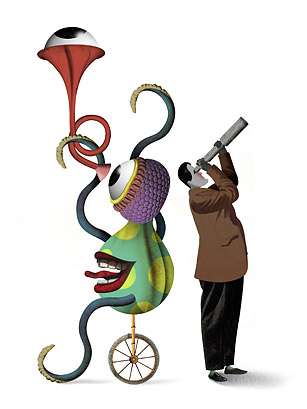
The recipe for life ought to be pretty simple: start with water, add some hydrocarbons and simmer for a million millennia or so. Nothing but chemistry plus energy plus time. It worked on Earth; it might have worked on Mars, till the planet dried up. For all we know, it's working right now in the deep oceans of Jupiter's moon Europa. Humans and aliens haven't connected yet, but with 1022 stars out there (that's 1 with 22 zeros), it's just a matter of time — right? Wrong. If exobiologists have learned anything, it's that you and your kids and their kids' kids will probably never hear the slightest peep from an alien. If E.T. the movie star is your idea of what extraterrestrial life might be like, you will be disappointed. If your thoughts run more to War of the Worlds, you can breathe easy.
How can we be so sure? Start with the numbers. Most stars are too far from Earth for us to hear from the theoretical inhabitants of any of the theoretical planets orbiting them. A signal from a star 1,000 light-years away would, by definition, take 1,000 years to get here — and that's just next door, in an observable universe with a radius of some 14 billion light-years. "If the nearest hundred or thousand stars don't have life, we probably won't ever, ever, ever know about it anywhere else," says astronomer Don Brownlee of the University of Washington, in Seattle.
Whether or not we ever hear from aliens, cooking up life may be a whole lot more complex than just mix, heat and serve. Even asteroids are known to have once contained water ice, and radio active isotopes — which have since decayed — provided them with warmth. But they're hardly crawling with living things. What's needed, says Brownlee, is a more varied world, like Earth, that has a lot of different environments. That leads to chemical disequilibrium, which in turn leads to electrons' being traded back and forth. That's what builds complex molecules and, later, organisms. "It's not a matter of random assembly," he says. "You could put all of the elements of life in a jar and wait a trillion years, and it'll still just be there."
Physicist and cosmologist Paul Davies of Arizona State University is even less persuaded of the odds of otherworldly life. The author of The Eerie Silence, which argues — well, you can guess — Davies questions some of the most fundamental premises of our search for extraterrestrial life, including our hunt for earthlike worlds. "There's certainly a lot of real estate out there, but habitable is not the same as inhabited," he says. "I have no idea what turns nonlife into life. I get irritated by people who say life can emerge in earthlike conditions."
Our scientific methods are also hopelessly poor, because almost all our theories of life are drawn from the only place we know it exists, which is right here. When your sample group is so vanishingly small — when n = 1, as the statisticians say — you've got a long way to go before you reach statistical significance.
But the biggest mistake exobiologists make may be believing that the only place to look for alien life is on alien worlds. The best place to find it could be on Earth. If life indeed developed with relative ease, Davies argues, it could have emerged numerous times in numerous different forms right beside carbon-based organisms like us. We don't see it because we don't know what we're looking for.
We've already discovered life in extreme environments on our own planet — notably in deep volcanic vents where water is heated to 120°C (250°F), temperatures that ought to be unsurvivable. Those organisms don't count as aliens because on the temperature spectrum, they're living in a zone adjacent to our own. "They don't stand out, because there's no discontinuity," Davies says. On the other hand, if we found no life at all in the 125°C-to-175°C (260°F to 350°F) range and then a critter popped up at 195°C (385°F), we might be onto something.
Of course, even such aliens would hardly be the kind we either crave or fear — those who could regale us with tales of what things look like on the other side of the cosmos on the one hand, or conquer us with their superior intellects on the other. Too bad — or maybe very good — you're never going to see them.